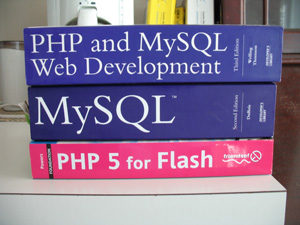 Trulia hindsight is a neat little mashup between maps and building data, it animates over time showing when houses were built over the last hundred years. (it turns out that most of Capital Hill here in Seattle was filled in by 1930, for example).
Trulia hindsight is a neat little mashup between maps and building data, it animates over time showing when houses were built over the last hundred years. (it turns out that most of Capital Hill here in Seattle was filled in by 1930, for example).
Sarcastic Gamer’s Microsoft Surface Parody
John Battelle reaches his Google saturation point
John Battelles Searchblog: Just Asking…
Ive found myself more and more wary of doing things that Id like to do with Google applications simply out of some primal, lizard brain fear of giving too much control of my data to one source. Its not that I dont trust Google, its not that I dont like the applications, its that Im worried they might fall to some ill use, out of the control of the current brand as Ive come to understand it today. Or perhaps its deeper than that – I simply cant let too much of my online life run through any one control point, regardless of who it is.
John Battelle wonders the same thing I wondered before, but of course, he writes it better and backs up his facts (damn journalists).
Lets put an end to the 3000 sq ft house on the 4000 sq ft lot
Megahomes multiplying, but how big is too big?
In an area with little land to build new houses, residents are fighting the megahome — McMansions that balloon to the edges of their properties, three-story giants that block views from quaint craftsman bungalows.
Seattle is considering new laws to limit the size of houses replacing those torn down on single-family lots. In Bellevue, residents came to a meeting with city staff Wednesday night to complain of huge homes that block out the sun and “overpower” the neighborhoods.
Yes, yes, so yes. Every time that we see a nice house with nicely scaled houses all around it, we have to do the math in our heads to figure out what a 3 story behemoth next door would do to our views, privacy and light. It’s happened to several of our friends and to us in our last house to a lesser extent. I would also like to see the extermination of the “buy a house, build 4 townhouses” style of development that is also rampant. The city should get serious about zoning to either maintain neighborhoods as single family, reasonably-sized homes, or they should designate neighborhoods as targets for high-density zoning and compensate the local homeowners appropriately. Right now, it is a higgly-piggly where high-density building (houses built to the edges of their lots, town-homes and condo developments are going into the middle of established single-family neighborhoods and destroying them like a cancer from the inside out.
The difference between being an Apple developer and a Microsoft developer
At the Microsoft Professional Developer Conference
Check out this new technology! It will be shipping next year, and it is super awesome! It is the way we are going and we’re putting a huge amount of effort behind it!
It sounds neat, you drop your old silly code and jump on the bandwagon figuring you’ll be ahead of the game . The next year: silence. No mention. What happened? Microsoft dropped it. Whoops, too bad.
At the Apple World Wide Developer Conference
Hey, we’ve completely changed the OS! You’ve got 30 seconds to rewrite all your apps!
This sucks. It happened with the switch to universal and it is happening now with the switch to 64-bit. The worst part is the arrogance that comes from the stage when Steve talks about how easy it is. It makes the software vendors look like crap to their users. The switch to universal was as simple as checking a check box if you were doing nothing interesting. Wolfram Research’s products are unix products, there isn’t any altivec assembly in them. Real products of real substance like Adobe’s or Microsoft weren’t so simple. Everyone in those companies had to drop what they were doing and spend months rewriting code (switching to X-Code was a serious en devour in itself) just to get back to where they started. Now, with the switch to 64-bit, Apple is now saying that they are dropping Carbon support. However, that is not what they were saying up to a week ago. If you look at the cached page on google for Leopard 64-bit, you’ll see the following quote:
Leopard delivers 64-bit power in one, universal OS. Now Cocoa and Carbon application frameworks, as well as graphics, scripting, and the rest of the system are all 64-bit. Leopard delivers 64-bit power to both Intel- and PowerPC-based Macs, so you don’t have to install separate applications for different machines. There’s only one version of Mac OS X, so you don’t need to maintain separate operating systems for different uses.
Dropping carbon is MAJOR. For apps that exist on both windows and OS X and for apps that predate Objective C, Cocoa is a non-starter. Many of Apple’s own major apps are written in Carbon. Apple just shafted their ISV’s and then told their user base that 64-bit was going to be awesome gearing them up for a second major revolt when the next set of apps come out and they aren’t 64-bit. This is the universal thing all over again. And WTF with Steve on stage saying “you’ve done a great job switching to universal, well, most of you.” Jackass.
Does virtualization herald the end of the platform war?
I was reading Marc Andreesen’s new blog and I came across this quote:
Virtualization — in the form of software like Parallels and VMWare Fusion — lets you deal with an individual operating system as if it were an application.
from blog.pmarca.com: At long last, switching back to Mac
and I realized that since Apple has completed the standardization of the X86-family as the chip architecture for 99% of the world, the platform really has gotten irrelevant. Now that OS virtualization technologies don’t require massive amount of processing power, you can mix and match all you want. Like OS X, but need to run some windows programs for work? No Problem. Like Vista, but really need to run that Linux app? Easy-peasey. This really got cemented when Parallels officially released version 3 of their windows virtualization solution which theoretically gives virtualized apps access to the GPUs for the first time. We’ll have to see what the cost (in performance) is, but we know that it will get more and more seemless over time.
This goes beyond just the OSes though. Flash/Flex/Silverlight all enter this as well, further blurring the lines between operating system, platform and application.
I could see that very soon, the OS that you run will be 100% based on personal preference and all the worries about compatibility will be gone. If that does happen, Microsoft better be scared. I think that Bootcamp and Parallels are much more of a long-term threat than Flash ever will be.
posting legislation BEFORE passing it
This isn’t a new idea, but I started thinking about it after I heard a commentator on some political show mention that people wouldn’t know what was in some legislation until after it got passed. What about the idea that congress should post the text of a bill BEFORE it comes up to a vote. Once a bill has been typeset, it is pretty much simplicity itself for the congressional printing office to also put up a copy on-line for the American people to review it. I love this idea. It would give the chance for a million eyes to find the loopholes and pork. It is impossible for a small congressional staff to read one of these 7,000 page bills and really get all the nuances in the short time between when they get the bill on paper and when the congressperson has to vote. It would also help eliminate some of the stupid crap that gets passed into law because it would give the American people to call BS beforehand.
Downsize DC has even posted the draft test of the “Read the Bills Act” and is collecting signatures.
The Seattle micro-startup community is organizing
I was around and in fact active in the first web bubble in Seattle. It was a heady time, cocktail parties and pitches. Companies grabbing up every inch of pioneer square loft space and such. Then it all went away and I retreated back into the corporate world so that I could pay the bills. When the new bubble came a knock’in it seemed that Seattle wasn’t jumping on the bandwagon as fast. I would hear about events and some new companies, but it didn’t seem like a tectonic shift like last time.
However, it seems like the Web 2.0 bubble hasn’t completely passed Seattle by. The Seattle PI has a nice article: Coffee, muffins and entrepreneurs, that is covering some of the local gatherings of entrepreneurs around Seattle. It seems like, this time around, the companies are keeping it on the down-low and small at first.
Here some of the links:
- Refresh Seattle – looks to be web startups only
- Ignite Seattle – I’ve been meaning to go to this, it looks like super-fun
- Seattle Mind-Camp – Geeks get together over a weekend and then stuff happens.
- Seattle Tech Startups Club – looks like this is over already


